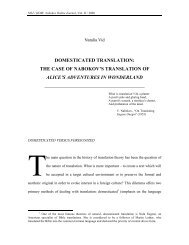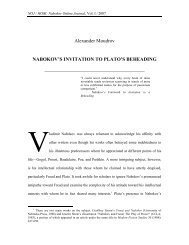Michael Maar Speak, Nabokov
Michael Maar Speak, Nabokov
Michael Maar Speak, Nabokov
Create successful ePaper yourself
Turn your PDF publications into a flip-book with our unique Google optimized e-Paper software.
<strong>Nabokov</strong> Online Journal, Vol. VI (2012)<br />
_______________________________________________________________________<br />
a compelling read, but will perhaps inevitably be subjected to charges of speculation and lack<br />
of evidence.<br />
As <strong>Maar</strong> recounts, the author himself described the writing of fiction as “a rare variety<br />
of madness” (Stories). The central thesis of the work lies in the notion that <strong>Nabokov</strong>’s<br />
relationship to reality was characterised by a sense of terror, which placed him precariously<br />
on the brink of madness – and how various incidents in his often tragic biography informed<br />
the distinctive genius of his prose. In the section Magician & Dwarf, these feelings of<br />
madness, which <strong>Maar</strong> defines as an ‘alternation between narcissistic dissolution and horror,<br />
between feelings of omnipotence and those of annihilation’ (10), were also felt by the<br />
German master Thomas Mann, a writer who often was often the victim of <strong>Nabokov</strong>’s<br />
mocking contempt. <strong>Maar</strong> presents evidence of the thematic parallels and motifs between<br />
Thomas Mann’s ‘Little Herr Friedmann’, and <strong>Nabokov</strong>’s short story ‘The Potato Elf’. He<br />
sums them up as ‘the artist as egomaniac; the outsider whose sorrow never ceases; the<br />
demonic, somewhat masculine woman; a whiff of misogyny; precise knowledge and<br />
outdoing of the competition’ (17). These conclusions stand out on the page, and may appear<br />
to be insinuation and speculation, if only because <strong>Maar</strong> seems to favour a certain type of<br />
writing style, usually beloved of Thriller and Mystery writers, which, while being<br />
entertaining, seems to detract from the quality of his arguments. This is unfortunate, as there<br />
are many brilliant insights. The author, for example, attributes <strong>Nabokov</strong>’s hatred of<br />
Dostoevsky, Freud and Mann to the commonalities which they shared. ‘The most brutal wars<br />
are civil and fratricidal’, he writes, and those writers occupied the ‘few posts in the<br />
borderland that <strong>Nabokov</strong> claims for himself alone’ (18).<br />
One of these borderlands is the realm of fairy tales, and the author suggests that<br />
<strong>Nabokov</strong>’s aesthetic disapproval of Mann is rooted in the Nobel Laureate’s appropriation of<br />
Hans Christian Andersen. Yet there is another reason, hinted at by <strong>Maar</strong>, as to why <strong>Nabokov</strong><br />
held such feelings of hatred towards Thomas Mann. Anyone who is familiar with Mann’s<br />
diaries, the author included, must have been aware of Mann’s anguishes about his sexuality<br />
and his dubious incestuous feelings towards his son Klaus, who he claimed to be in love with.<br />
<strong>Maar</strong> suggests that <strong>Nabokov</strong>’s antipathy was primarily linked to his disapproval of Mann’s<br />
homosexuality. The author maintains that “<strong>Nabokov</strong>’s work is a forest in which it is easy to<br />
lose oneself and see nothing but the trees.” (vii) Thus minute details, such as an account in<br />
<strong>Speak</strong>, Memory of how the young <strong>Nabokov</strong> may have been molested by his uncle, leads to<br />
the development of his compulsive and often belligerent homophobia, and the endless cast of
















